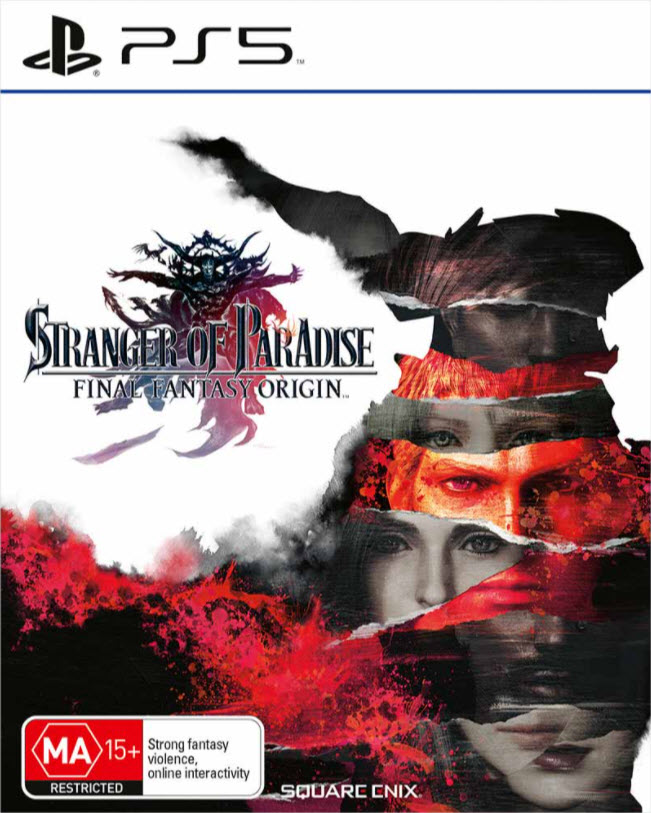Stranger of Paradise Final Fantasy Origin
Developer: Koei Tecmo
Publisher: Square-Enix, Koei Tecmo
Platforms: PC (Reviewed), PlayStation 4, PlayStation 5, Xbox One, Xbox Series X
Release Date: 18 March 2022
Price: $89.95 AUD / $59.99 USD – Available Here (PC) / Available Here (PS5)
Overview
I must admit that when Stranger of Paradise was first announced, it took me by surprise. With the next entry in the series set to be Final Fantasy XVI, I’d never expect Square-Enix to revisit the very first Final Fantasy in a manner that wasn’t just a new remaster. In fact, Stranger of Paradise’s reveal trailer left me intrigued in more ways than one; Final Fantasy I was to become a dark fantasy action game made by Team Ninja. Not to mention that it featured the protagonist, now an angry dude called Jack, finishing up enemies just like Kratos in God of War, while saying that he must kill “Chaos” every two seconds. It all left me with a mix of confusion, curiosity, and a bit of repulse all at the same time. Then, came the subsequent trailers showing how hilariously edgy Jack is. The trailer with the Frank Sinatra song sealed the deal for me: it’s all too absurd, it was chaos, if you’ll forgive the pun. And with that, Stranger of Paradise became one of my most anticipated titles this year.
Story
The world lies shrouded in darkness. The wind dies… The sea languishes… The earth decays… But the people believe in a prophecy, patiently awaiting its fulfillment, “when darkness veils the world, four Warriors of Light shall come.” Stranger of Paradise has the same basic premise of the original FFI. Here, the so-called “Warriors of Light” are a bunch of amnesiacs who only know one thing: They must kill Chaos. For that purpose, they seek the king of Cornelia, who possesses the key to the Chaos Shrine, where Chaos supposedly awaits. After paying a visit to the Chaos Shrine, the journey to restore the four crystals begins in earnest, just like how it was in the original FFI.
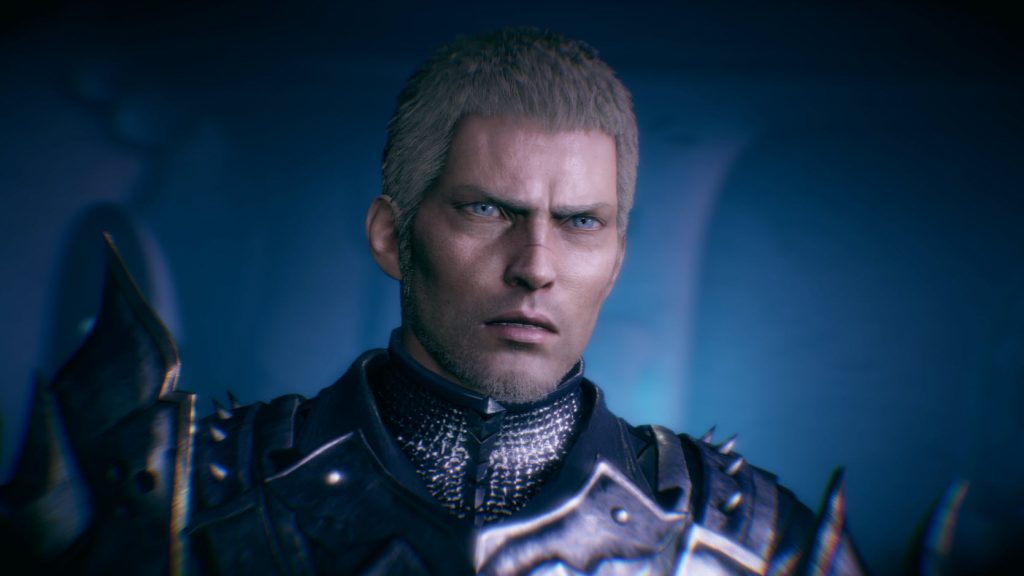
FFI didn’t have much of a story besides the above description and the final twist, which is understandable since it’s a 1987 game and also one of the forefathers of JRPGs. Stranger of Paradise greatly expands and changes the lore. For starters, you now have a fully fledged cast of characters with their own names and personalities. Despite this, Jack is the center of attention; if you played FFI to its conclusion and have been following Stranger of Paradise, you already have a good idea of what is to come. Since the game is a brawler/hack n’ slash, the story is presented in a way that won’t slow down the action. Besides a few cutscenes here and there, the story is told with snippets of text describing the stage you’re about to take on, or in the form of documents found during exploration.
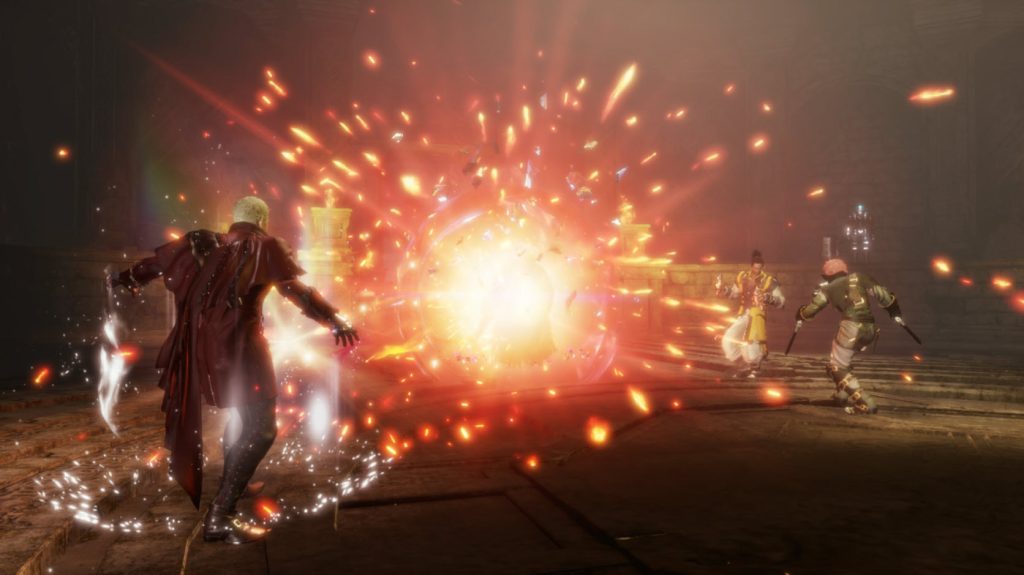
Gameplay
After the first cutscene, where a huge knight clad in dark armor massacres an army of soldiers in what is the most brutal depiction of violence that I’d never expect to see in an FF title, the player is thrown right into the introductory battle against Tiamat, one of the original four fiends in FFI. Shortly after, the player is introduced to the basics of Stranger of Paradise’s combat.
The combat mechanics are varied, solid, and easy to pull off. Landing every hit is very satisfactory, as your character’s moves feel weighty without being slow. Right off the bat, Jack can attack with a press of the R1 button, dodge, roll, block, and use special abilities. To balance things out, there’s also a Break Bar that depletes as you block. When this bar is completely exhausted, Jack will be defenseless for a period of time. To avoid this, you can perform two types of parries; a just defend type parry where you must block at the last moment, and the Soul Shield. The Soul Shield is a fundamental mechanic in Stranger of Paradise. It allows you to parry the opponent’s attacks, but in doing so, a bit of your break bar is restored. Not only that, the Soul Shield also restores and even increases your maximum MP. In the same way that Jack has a break bar, so do enemies. By depleting their break bar with attacks that they’re vulnerable against, enemies will also be defenseless; this allows Jack to use yet another important ability: The Soul Burst, or the “God of War finisher” that could be seen in the old trailers. Soul Bursts are satisfying to perform and also provides a much-needed relief when you’re overwhelmed by enemies. The Soul Burst will also refill and increase your current MP bar. You may feel that Stranger of Paradise isn’t a game for you, since the wireframe for the combat is based on Nioh. Fortunately, there are a bunch of difficulty settings to choose from. Story difficulty is the equivalent of an easy mode -You can even dial down the difficulty even more to casual mode if all you want is to experience the story-. Action is the standard difficulty and the one that I’d recommend to anyone who wants to experience most of what the game has to offer without being frustrated. Hard mode is what would be more or less the equivalent of a souls-like game, and better experienced when you have a good grasp of the game’s mechanics. Regardless, you won’t need to worry about the game’s difficulty, as it can be changed at anytime.
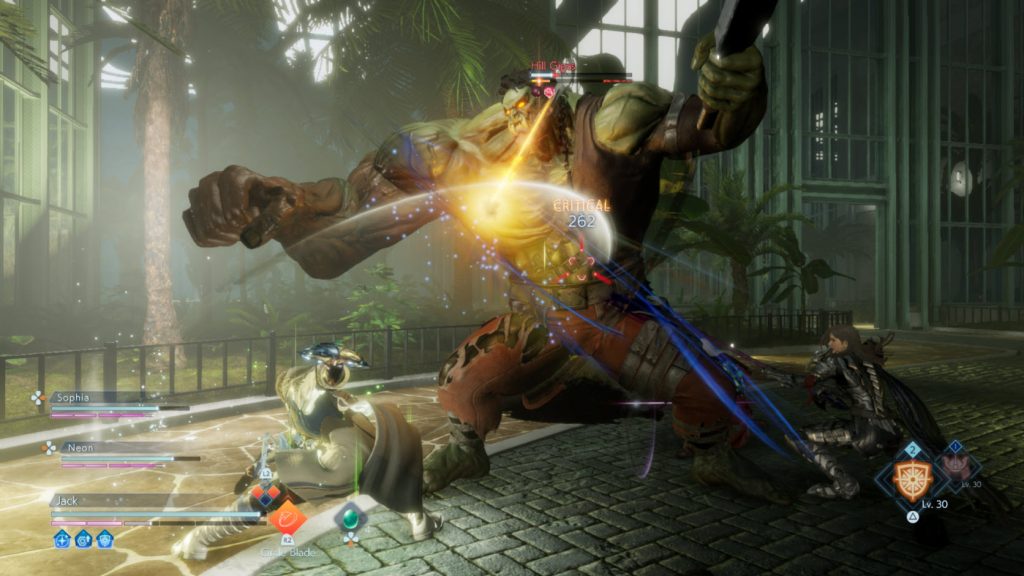
The game progression is similar to what you can find in Nioh, but more simplified; most of the time you’ll be running through narrow corridors while dispatching enemies. Stranger of Paradise is a game about combat, a hack n’ slash if you will. It lacks the complexity and slow pace of a souls-like, so it’d be more apt to compare it to other action games such as Devil May Cry and whatnot.
Since this is still a Final Fantasy title, it’s not without some RPG elements. Similar to other FF titles, there’s a job system that is simple at first glance, but gets more complex the more you play due to the sheer number of jobs and the skills that you can unlock. Your characters can’t level up, but your jobs do. At first, you unlock jobs by finding weapons related to them; this is done like in a tutorial: you find a weapon, and a situation where the job is required. This makes the concept of jobs easy enough to grasp. After that, you must level up these jobs to unlock others and so on. There’s immense potential for different builds thanks to the job system. I could write a text as big as this review just explaining and detailing the possibilities. Customizing your jobs and ability load-out, and then taking it for a spin, is one of the highlights of Stranger of Paradise. The loot system is a simplified version of the one in Nioh. You can’t find any items besides important ones that allow you to progress the game and equipment. Your equipments are very important, since besides granting extra stats bonus, they can also have job affinities. These affinities will unlock more stats parameters related to that job and also grant experience for them, even if you’re not currently equipped with that job. The problem here is that enemies and chests will drop a lot of equipment. It’s a drag to sort through all of them, meaning that you can end up spending hours during your playthrough just choosing what to use, keep, or dismantle.
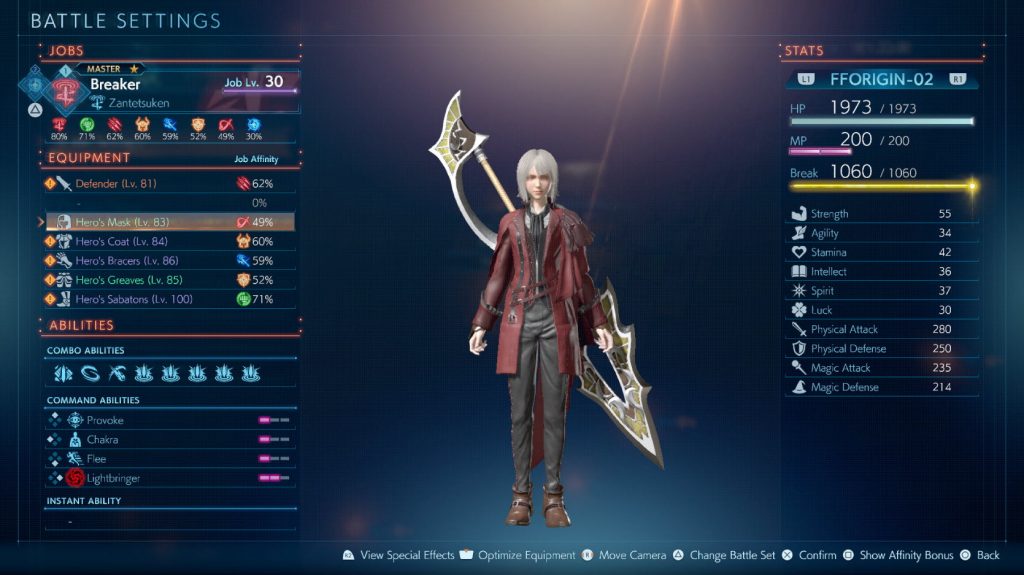
You can play solo, or with the help of two other characters in your party. The good news is that your party isn’t completely useless. Most of the time, these NPCs only serve to distract enemies from Jack, and they won’t get incapacitated easily, even on hard difficulty. Their real usefulness comes into play when you activate an ability called Resonance; you can send one, or both of them to unleash a barrage of attacks onto enemies. Once Resonance is over they go back to being sitting ducks, but there isn’t a limit to how many times you can use Resonance. You just need to wait until its cooldown period is over.
You can also play online; you’re able to choose which character you’ll control, while the other players are assigned what’s left randomly. At the moment, it isn’t too easy to find games on the PC version, but I was able to get a few games going once I disabled the regional restrictions in the options menu. Even playing with people from god knows where, the online performance was generally very good, and it was a lot of fun playing with two other people.
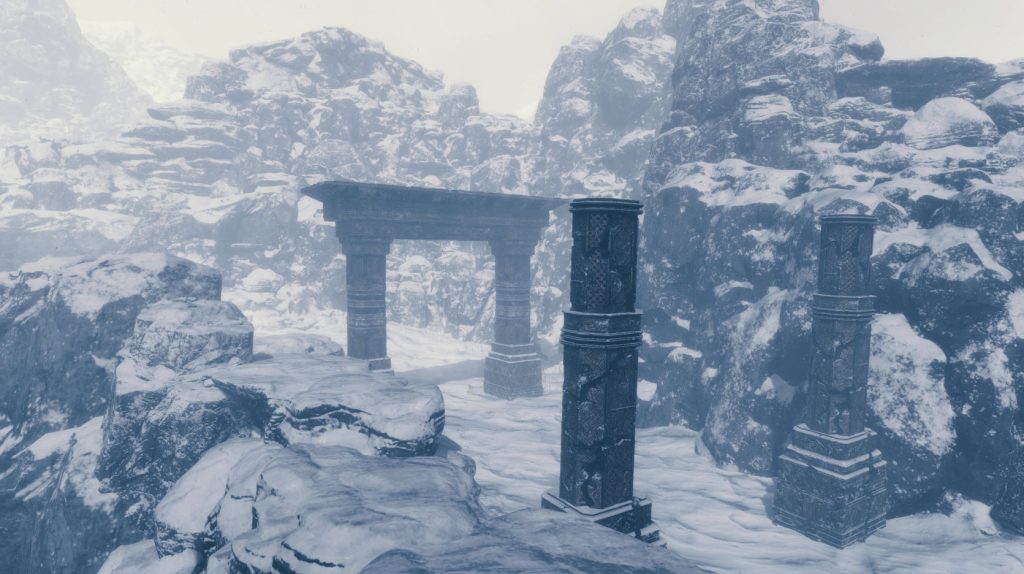
Visuals
In 2022, Final Fantasy commemorates its 35th anniversary, and Stranger of Paradise is part of an effort by Square Enix’s to bring games that showcase the series throughout its history. The missions in the game are a trip down memory lane, spanning areas inspired by dungeons from FFI through FFXV. We have, for example, the Sunleth Waterscape from FFXIII, the Tomb of Raithwall from FFXII and many other known locations. Stranger of Paradise doesn’t have the budget of Final Fantasy 7 Remake, so don’t expect the level of detail that game has, especially in regard to its character models and animations. Even so, Stranger of Paradise’s visuals are good enough, if not a bit too simple for a Final Fantasy title. The main character models are a throwback to Square Enix’s RPGs of old, so Nomura dialed down a lot on his fashion preferences. The best part of Stranger of Paradise’s graphics are the monster designs, especially bosses and mid-bosses which have a high level of detail. Unfortunately, the dungeons don’t follow this same trend, and more often than not, are too dark and lifeless.
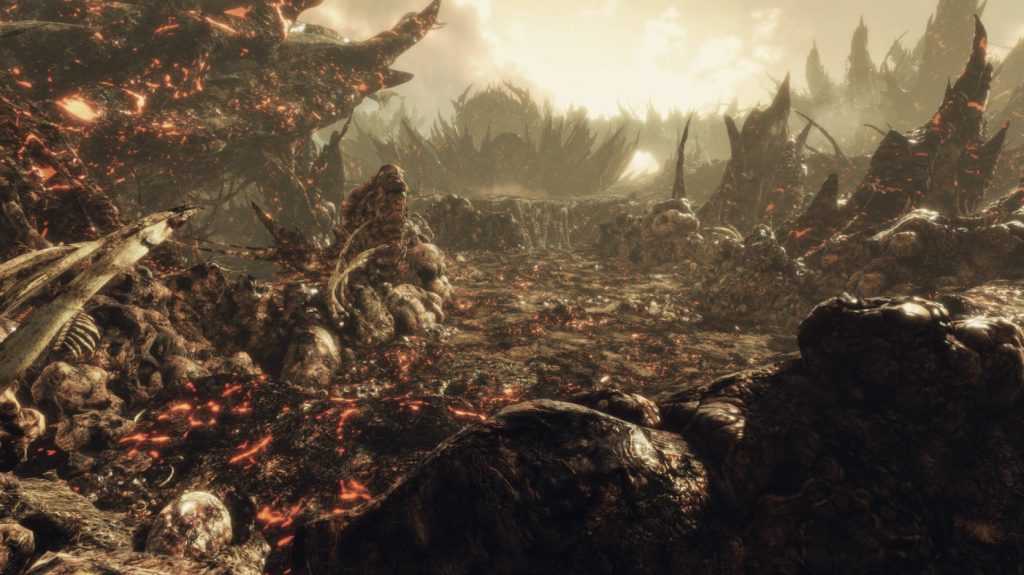
The worst offender in this department is the game’s performance, especially on PC. The initial 1.01 version had horrible frame drops. In more populated areas, especially boss fights, or when doing a Soul Burst, the game suffered from slowdown so severe that it almost felt like it would crash. Almost a week after its launch, Stranger of Paradise received its first patch. I had the opportunity to test it, and I can say that while the game’s performance is far from perfect, it was improved significantly. Using specs that are a bit above the recommended by Square Enix, I can play the game without much frustration now.
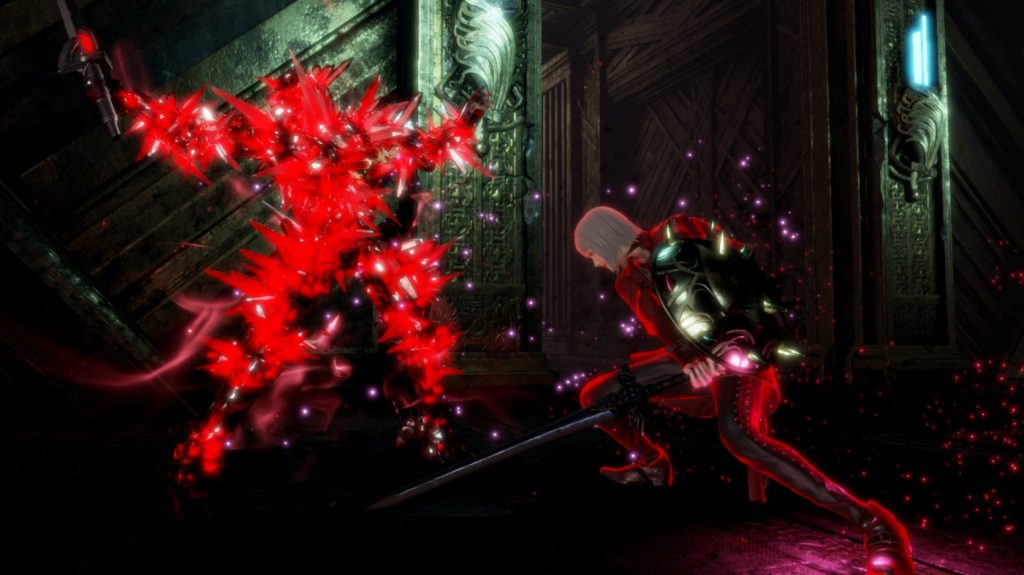
Audio
In the same way that the dungeons are a homage to past FF iterations, the soundtrack features motifs from previous games. This is a very nice touch, but Stranger of Paradise features a lot of original themes too. Overall, the soundtrack complements the action perfectly, while providing a lot of nostalgia to old fans.
Overall
Stranger of Paradise Final Fantasy Origin is a very fun action game, especially online. It also does an incredible job in celebrating the richness of the Final Fantasy series. Team Ninja did a good job in using its Nioh formula here, even if the exploration part took a big hit. The PC port still needs adjustments, but it’s playable enough in its current state.
Capsule Computers review guidelines can be found here.


